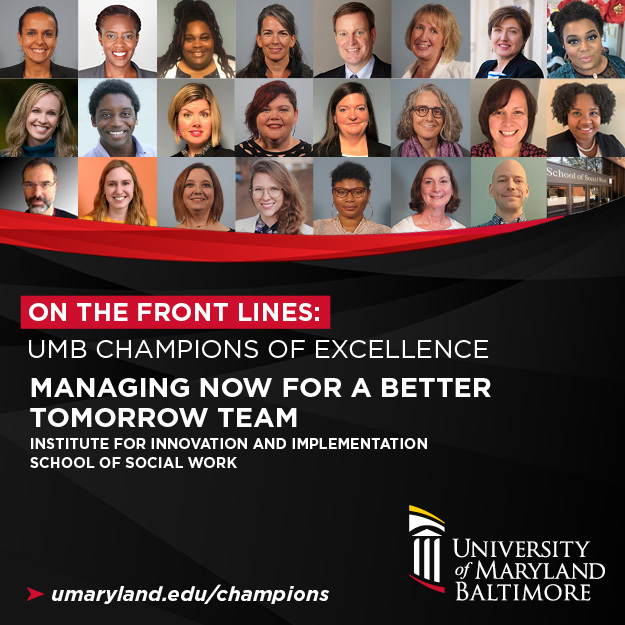On the Front Lines: UMB Champions of Excellence: Managing Now for a BETTER Tomorrow Team
October 07, 2020 Charles Schelle
The School of Social Work’s Institute for Innovation and Implementation created a COVID-19 webinar series to serve and support organizations that aid vulnerable youth and their families.
The Champions of Excellence campaign is a multiyear branding campaign at the University of Maryland, Baltimore (UMB) in which we highlight individuals and teams that exemplify extraordinary accomplishment and represent excellence at the University. This year, UMB is highlighting the employees who've done exemplary work since the COVID-19 pandemic unfolded in March. During the next few months, The Elm will be featuring these UMB Champions, who are making Baltimore, our region, and in some cases the world a better place.
Today: Managing Now for a BETTER Tomorrow Team, Institute for Innovation and Implementation, School of Social Work
COVID-19 has changed everything, and the management of services provided to vulnerable youth and their families through governmental systems and other organizations is no exception.
When the pandemic hit, the Institute for Innovation and Implementation (the Institute) at the University of Maryland School of Social Work heard from professionals who support youth and their families that they needed support, too — to meet clients’ changing needs in the areas of physical and mental health, substance abuse, education, homelessness, and more.
Soon after stay-at-home orders were declared around the nation, a team from the Institute assembled and launched a way for professionals — including family- and youth-run organizations — to talk and share ideas and resources to help their clients.
(Watch video below.)
The team created webinars titled “Managing Now for a BETTER Tomorrow: Conversations & Resources During COVID-19.” In the series’ first 13 sessions, more than 7,000 participants from states, tribes, and territories discussed the challenges of supporting clients as the traditional delivery of care and services was interrupted.
“We had residential facilities unsure about whether they could continue to serve children,” said Michelle Zabel, MSS, assistant dean and director of the Institute, which is celebrating its 15th anniversary. “We had in-home service providers unable to go into people’s homes. Many of them had never undertaken clinical care using telehealth technology, and almost overnight they were serving families and youth in an entirely new way.
“We realized that we needed to convene the field to be able to learn from each other,” Zabel added. “This is exactly what we set out to do — to be a hub to broaden learning across the country and gather best practices to share and make a difference for youth and their families.”
Conversations were organized around crisis communications, in-home behavioral health services, supporting families, residential interventions, infant and early childhood mental health, mobile crisis response and stabilization, school mental health, housing instability and homelessness, rural mental health, and young adult professionals working in the field.
There also was an overlap into racial equity issues when protests erupted across the nation after George Floyd was killed by police in Minneapolis. Through it all, the Institute’s team members put their skills as connectors and facilitators to good use.
“We were intentional about structuring these webinars as conversations, not as traditional webinars,” Zabel said. “People needed to engage and talk with each other and with experts.”
The series continues this fall, pivoting from “managing now” to creating a “better tomorrow.” Resources are updated on the initiative’s website, including an interactive map of COVID-19 telehealth Medicaid expansions.
Meanwhile, as solutions are created to address the COVID-19 crisis, Zabel says it’s important that people are not forgotten.
“It’s easy to forget when your work is focused on policy or finance that there are children and families who are either thriving or not because of that work,” Zabel said. “It’s important to me and everyone who works at the Institute that we continue to listen and learn from youth and families and use our national platform to elevate their voices. We see the work we do as an investment in our community.”